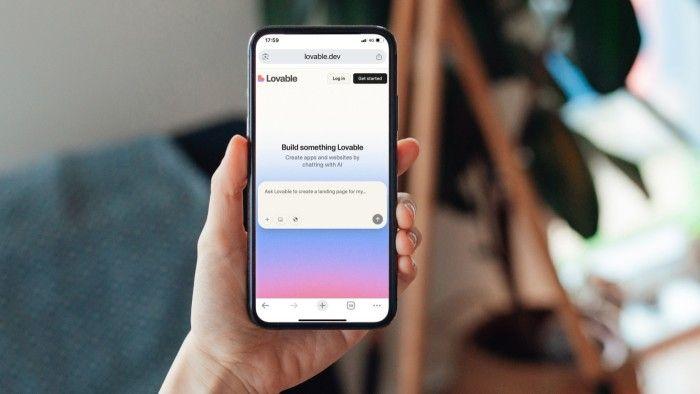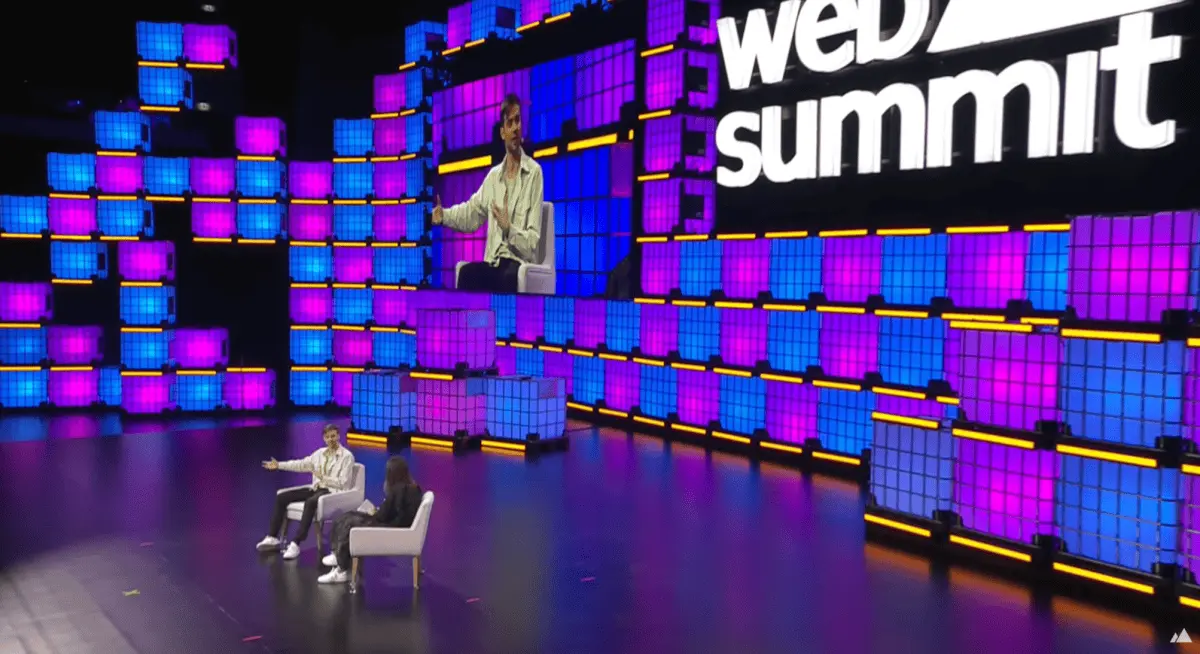Lovable: The AI 'Vibe-Coding' Startup Poised for $150M Raise at $2B Valuation
3 Sources
3 Sources
[1]
Lovable on track to raise $150M at $2B valuation | TechCrunch
Lovable, one of the darlings of the vibe coding world and one of Europe's fastest-growing AI startups, is working on raising a fresh round of over $150 million at a near $2 billion valuation, the Financial Times reports. The raise and giant step-up in valuation comes just months after the Swedish startup raised a $15 million round led by Creandum in February. The company described that round to TechCrunch as "pre-series A," but with numbers this large, it's safe to say that Lovable has jumped from seed rounds to priced growth rounds, whatever the serial alphabetic label should be. Accel is said to be leading this new raise, with Creandum and others like 20VC participating. While the company is technically two years old, founded in 2023, it released its web-app building product in late November. In May, Lovable CEO Anton Osika tweeted that Lovable hit $50 million in ARR in six months. Lovable, like competitors Replit and Bolt, builds entire web apps from an initial text prompt, including a user interface/front end (often via the popular UX coding tool React) and connected to a database like Supabase. Some users say it's affordable, starting at $25 a month for 250 "credits." One Reddit user documented an app with 29,000+ lines of code and dozens of functions built for $250. On Monday, Lovable announced that it was releasing a beta version of an AI agent that could automate more tasks like editing code after reading project files or debugging. Lovable will charge on a usage-based model for this: the more the agent is asked to do, the more credits it will charge. While this may increase fees for users if they turn over their app management to the agent, this pricing model is shaping up to be the default business model for agents. This is because the AI startups themselves have to pay variable fees to model providers like OpenAI or Anthropic. All this to say, such business model strategies would make investors happy. Accel, 20VC and Lovable did not respond to a request for comment.
[2]
Swedish AI 'vibe-coding' start-up Lovable valued at almost $2bn
A two-year-old Swedish artificial intelligence start-up that promises to make programming an app as easy as writing a few sentences is nearing a valuation of almost $2bn, in the latest sign of investor fervour for AI coding businesses. Lovable is set to attract more than $150mn in new funding less than six months after its previous round, according to people familiar with the deal, making it one of Europe's fastest-growing AI start-ups. Venture capital group Accel was leading the round, with existing investors such as 20VC and Creandum also participating, these people said. Lovable increased the amount of money raised and its valuation during the fundraising process due to overwhelming interest from investors, they added. The deal, which is still to be finalised, is set to value Lovable at about $1.8bn. Lovable declined to comment on its fundraising. Accel did not respond to a request for comment. Europe has generally been seen as lagging behind the US and China in generative AI, especially when it comes to the foundation models upon which chatbots such as OpenAI's ChatGPT and Google's Gemini are built. However, Lovable is one of a new crop of European AI start-ups, mainly working on applications and services aimed at businesses. Companies such as Mistral, Synthesia and DeepL -- as well as defence tech group Helsing -- are now raising funds at multibillion-dollar valuations. Lovable is also the latest example of investors rushing to back "vibe coding" start-ups, as software engineering tools emerge as one of the most effective ways to commercialise generative AI technology. Andrej Karpathy, a former Tesla and OpenAI engineer, coined the phrase "vibe coding" in February to describe an almost trance-like state of using AI to create software "where you fully give in to the vibes, embrace exponentials, and forget that the code even exists". Lovable was founded in Stockholm in 2023 and launched its AI coding product late last year, quickly attracting attention for its ability to let people with no technical expertise create fully functioning apps and websites. Its programming tool draws on the output of various AI models, including from OpenAI, Anthropic and Google. Lovable then adapts their code to create for whatever kind of app the user wants to build. The company raised $15mn in February in a deal led by Creandum, an early Spotify investor. At the time Lovable said it had reached $17mn in annual recurring revenue and more than 30,000 paying customers within three months. Lovable now generated $75mn of annual recurring revenue, just seven months after its launch, its chief executive and co-founder Anton Osika said last week. "This is by far Europe's fastest-growing company ever," said one investor. "I've never seen a company grow this fast." Coding assistants have rapidly become a crowded field, as AI systems tuned for software programming from Microsoft, OpenAI and Anthropic jostle with tools from start-ups including Anysphere, Poolside, Bolt and Replit. Design software apps Figma and Canva are also adding AI features. Anysphere, the US-based maker of the Cursor coding assistant, more than tripled its valuation to $9bn during the first half of this year, after raising $900mn in May. Lovable's investors say its differentiator is that it allows anyone to create a complete app or website even if they have no coding experience, opening up its market to consumers and small businesses as well as corporate leaders who want to prototype their ideas. Tools such as Cursor, on the other hand, are designed to assist more experienced programmers.
[3]
No-code platform Lovable eyes $150M raise and double unicorn status
The Stockholm-based business has built a generative AI platform that allows non-technical users to build apps or websites based on simple text prompts. "I decided what we needed to do is build for the 99% who do not create software," Anton Osika, Lovable's co-founder, told TNW in April. Osika founded Lovable alongside Fabian Hedin in 2023. Last week, Osika said the company had generated $75mn in annual recurring revenue (ARR) within seven months of launching the platform, making it one of Europe's fastest-growing startups. By allowing non-technical founders to create successful businesses without any prior coding or software experience, Osika believes the company is "unlocking a new economy." If Lovable's funding round closes as expected, it would mark one of Europe's biggest funding rounds of 2025 so far -- and the latest sign of investor appetite for AI developed on the continent. It follows Helsing, which builds AI software for defence, raising a hefty €600mn in June, and DeepMind spin-off Isomorphic Labs, which uses AI for drug discovery, securing €508mn in March. And if reports are to be believed, French AI startup Mistral is planning a whopping €1bn raise for later this year. Lovable's funding round will be its largest to date by far. The startup previously raised €6.8m in seed funding in October and a $16mn seed round in February, according to Dealroom data. According to the Financial Times, early Facebook investor Accel is leading the latest round, with existing investors such as 20VC and Creandum also joining in.
Share
Share
Copy Link
Swedish AI startup Lovable, specializing in no-code app development, is on track to raise $150 million at a nearly $2 billion valuation, marking rapid growth in the AI-powered software development sector.
Lovable's Meteoric Rise in AI-Powered App Development
Lovable, a Swedish artificial intelligence startup, is making waves in the tech world with its innovative approach to app development. Founded in 2023 by Anton Osika and Fabian Hedin, the company is on track to raise over $150 million at a valuation of nearly $2 billion, according to recent reports
1
2
. This significant funding round, led by venture capital group Accel, comes just months after a $15 million "pre-series A" round in February 20251
.Revolutionary 'Vibe-Coding' Technology

Source: FT
At the heart of Lovable's success is its AI-powered "vibe-coding" platform, which allows users to create fully functional web apps from simple text prompts. This technology democratizes app development, making it accessible to non-technical users and entrepreneurs
3
. The term "vibe coding," coined by former Tesla and OpenAI engineer Andrej Karpathy, describes an almost trance-like state of using AI to create software2
.Lovable's platform utilizes various AI models, including those from OpenAI, Anthropic, and Google, to generate code for user interfaces and database connections
1
. This approach has proven highly effective, with some users reporting the creation of complex apps with thousands of lines of code for as little as $2501
.Rapid Growth and Market Position
The company's growth has been nothing short of extraordinary. Within six months of its late November 2024 product launch, Lovable reportedly achieved $50 million in annual recurring revenue (ARR)
1
. By July 2025, this figure had grown to an impressive $75 million ARR, cementing Lovable's position as one of Europe's fastest-growing startups2
3
.Competitive Landscape and Business Model
Lovable operates in an increasingly crowded field of AI-powered coding assistants. Competitors include established players like Replit and Bolt, as well as newer entrants such as Anysphere, Poolside, and Cursor
1
2
. However, Lovable distinguishes itself by targeting a broader market, including consumers and small businesses with no prior coding experience2
.The company's business model is based on a usage-based pricing structure, with plans starting at $25 per month for 250 "credits"
1
. Recently, Lovable announced a beta version of an AI agent capable of automating tasks like code editing and debugging, which is expected to operate on a similar usage-based model1
.Related Stories
European AI Landscape and Investor Interest

Source: TechCrunch
Lovable's success highlights the growing prominence of European AI startups. While Europe has generally been perceived as lagging behind the US and China in generative AI, companies like Lovable, Mistral, Synthesia, and DeepL are now attracting significant investor attention
2
. This trend is part of a broader surge in funding for AI-powered software engineering tools, as exemplified by US-based Anysphere's recent $900 million raise at a $9 billion valuation2
.Future Prospects and Industry Impact
As Lovable continues its rapid ascent, it has the potential to reshape the software development landscape. By "unlocking a new economy" of non-technical founders creating successful businesses, as Osika puts it, Lovable could democratize app development on a global scale
3
. The company's upcoming funding round, if successful, will not only solidify its position in the market but also serve as a testament to the growing investor confidence in AI-powered development tools and European tech innovation.References
Summarized by
Navi
Related Stories
Lovable raises $330M at $6.6B valuation as vibe-coding startup triples worth in five months
16 Dec 2025•Startups

Lovable: The AI Vibe Coding Startup Redefining Software Development
18 Jul 2025•Startups

Lovable Surges to Nearly 8 Million Users as AI Coding Platform Targets Non-Technical Market
11 Nov 2025•Startups

Recent Highlights
1
ByteDance's Seedance 2.0 AI video generator triggers copyright infringement battle with Hollywood
Policy and Regulation

2
Demis Hassabis predicts AGI in 5-8 years, sees new golden era transforming medicine and science
Technology

3
Nvidia and Meta forge massive chip deal as computing power demands reshape AI infrastructure
Technology





